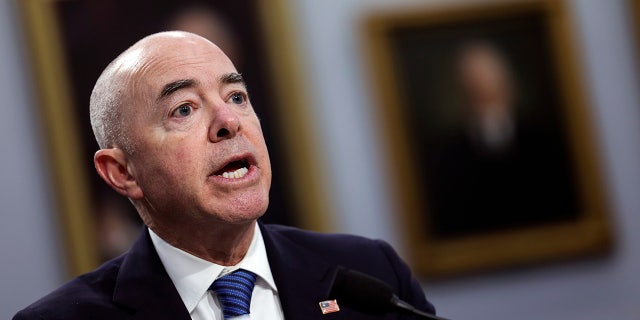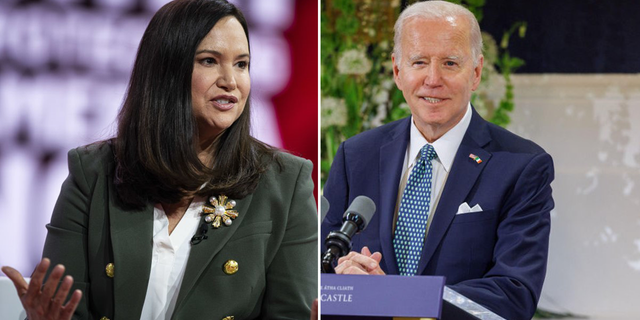The Biden administration was denied its request to stay a lower court order that blocked it from implementing a policy that allows for the release of migrants into the U.S. without court dates — clearing the path for the administration to make a last ditch effort to the Supreme Court.
On Monday, a three-judge panel of 11th Circuit Court of Appeals issued a decision denying the Biden admin’s request to stop a lower court judges order from taking effect while the case plays out in the courts on the merits.
The Biden administration now has the option to file an emergency appeal to the Supreme Court to stop stay the lower court’s decision.
The 11th Circuit panel didn’t buy the Department of Homeland Security’s (DHS) claims in court that not issue a stay would cause “irreparable” harm.
Migrants who have been processed by U.S Border Patrol and have been released from their center, are given assistance from the Regional Center for Border Health to relocate to areas outside of Yuma, on Friday, May 12, 2023 in Somerton, AZ. (Gary Coronado / Los Angeles Times via Getty Images)
FEDERAL JUDGE BLOCKS BIDEN ADMIN FROM RELEASING MIGRANTS WITHOUT COURT DATES AS TITLE 42 EXPIRES
“…DHS’s claims of irreparable injury ring somewhat hollow. In this record, considering the department’s track record of overstating similar threats in the underlying proceedings. For instance, on January 12, 2023, DHS represented to the district court that any vacatur of the Parole+ ATD policy would result in ‘disastrous consequences’ for the management of the border starting the very next day,” Mondays order reads.
“DHS made the same representation again on February 16, 2023. But, in truth, CBP had stopped using the Parole+ ATD practices as of January 2, 2023, and DHS now admits that it was able to ‘manage[] its detention capacity [since January] using many other tools at its disposal.’ The department’s ability to ascertain future harm is uncertain at best,” it continued.

U.S. Homeland Security Secretary Alejandro Mayorkas testifies before a House Appropriations Subcommittee on April 27, 2022 in Washington, DC. Mayorkas testified on the fiscal year 2023 budget request for the Department of Homeland Security. (Kevin Dietsch/Getty Images)
FLORIDA AG MOODY MOVES TO BLOCK DHS FROM RELEASING MIGRANTS INTO INTERIOR WITH COURT DATES
“Given this record, we take DHS’s latest claims of impending disaster if it is not allowed to use either of the challenged policies with some skepticism,” it said.
The court battle stems from a lawsuit brought by Attorney General Ashley Moody of Florida over a border policy set forth in a Border Patrol memo last month, which said that migrants can be allowed into the country on parole — a process typically reserved for “urgent humanitarian reasons or significant public benefit” — if Customs and Border Protection (CBP) faces overcrowding.
The memo called the practice “parole with conditions” as migrants are required to make an appointment with Immigration and Customs Enforcement (ICE) or request a Notice to Appear by mail.

Republican Florida Attorney General Ashley Moody (left) and President Joe Biden (right). (Getty)
FLORIDA AG SUES BIDEN ADMIN TO STOP PLANNED MASS RELEASE OF MIGRANTS AS TITLE 42 ENDS
Moody sued after media reports emerged of the planned releases, arguing the policy was “materially identical” to a “Parole + ATD” policy previously blocked in court.
Federal Judge T. Kent Wetherell II imposed a two-week restraining order on the Biden administration policy, which would see migrants released on “parole with conditions,” just ahead of the scheduled end of the Title 42 public health order.
While DHS had acknowledged the plan to release migrants without court dates, it had rejected the idea that it was conducting “mass” releases, saying instead that those releases were only taking place on a case-by-case basis. A DHS spokesperson had told Fox News Digital on last month that “reports that CBP is allowing or encouraging mass releases of migrants are categorically false.”
The 11th Circuit decision comes just days after AG Moody filed an amended complaint in the case, expanding her arguments to include that Border Patrol is continuing to release migrants on their own recognizance with a court date (known as a notice to appear, or NTA).
While this has happened continually during the Biden administration, DHS recently told the court it has taken steps to “streamline” the process.
CLICK HERE TO GET THE FOX NEWS APP
Florida is therefore arguing for a review of the agency’s policy and for it to be set aside, asserting that most of the releases of migrants into the U.S. are because of the NTA/OR policy. The arguments also say that DHS has failed to consider alternatives to releasing migrants, including reopening family detention and ending the Flores consent decree, which limits how long minors can remain in custody.